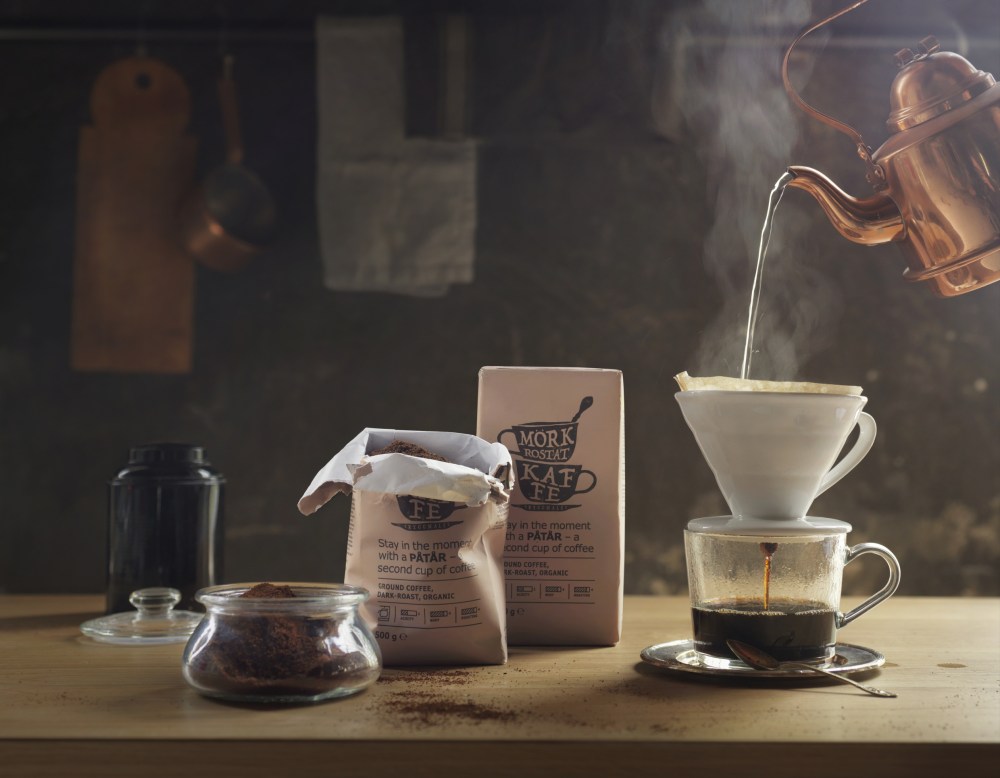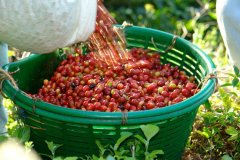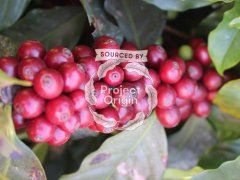The counterattack of Robusta Coffee beans Robsta will replace Arabica and enter the boutique coffee world.

Professional coffee knowledge exchange more coffee bean information please follow the coffee workshop (Wechat official account cafe_style)
Manning's Robusta pedigree, Arabica beans or Katim or Katim?
As a very important variety in the coffee world, Robusta plays an important role in the business world. Although Q-Grader is already familiar in the coffee circle, the backbone of the coffee business empire cannot be separated from Robusta and R-Grader.
When discussing Arabica, we will pay attention to its grade, taste, quality, producing area and other factors, while in Robusta's world, there are many details that affect the final result.
Compared with Arabica, Robusta has more than twice as much caffeine and is generally considered to be of lower quality than Arabica. However, the value of high-quality Robusta lies in the combination of espresso beans, which is very important for the quality of espresso.
Robusta is easier to grow, more resistant to disease, can grow at lower elevations and is more adaptable to weather conditions than Arabica. Robusta produces far more than Arabica and has a shorter ripening cycle.
Robusta generally grows in the Eastern Hemisphere, mainly in Africa, Indonesia and Vietnam. Arabica is also grown in Africa and Papua New Guinea, but today it is mainly grown in Latin America. Among the major coffee producing countries in the world, Colombia only grows Arabica coffee. The vast majority of coffee grown in Vietnam is Robusta. Both Brazil and India are grown.
In fact, Robusta is also divided into many categories, can not be generalized or blindly pursue the price. Among the big coffee countries, Robusta's major producers are Vietnam, Brazil, Indonesia, India and so on. Like Arabica, Robusta in each country has a corresponding hierarchy. According to different grades, we can see the general quality standard of raw beans.
Is Robusta about to replace Arabica?
Mike Neumann, former CEO of industry giant Newman Coffee, said that with the increasing production and consumption of coffee, Robusta has gradually begun to replace the dominant position of Arabica market. Production is increasing in economically stable countries because of its lower production costs.
In 1950, Robusta accounted for only 13% of the world's coffee production, while in 2015, it was almost 45% on a par with Arabica.
By 2030, Robusta will have 55% of the world coffee market, and he predicts that coffee consumption will reach 200 million packets a year, 50 million more than the same period last year, and the increase in Robusta production will be of great benefit to the market in adapting to the excessive growth of coffee consumption.
Robusta is poised to overtake arabica as the more produced, and drunk coffee, the former chief executive of industry giant Neumann Kaffee Gruppe Michael Neumann said, citing lower production costs and growth in countries with stable economic records.
Robusta coffee-which accounted for just 13% of world coffee production in 1950, with the balance arabica beans has already raised its share to 45%, as of 2015.
By 2030, robusta will account for 55% of world volumes with its growth helping meet the challenge of coffee consumption which he forecast then reaching 200m bags, some 50m bags more than current volumes.
In addition to the coffee consumption driven by the growing population, coffee drinks are also more popular because of the continuous improvement of the taste of coffee.
Besides being spurred by a growing world population, coffee drinking is being lifted by an increased taste for coffee
Robusta's rise in the world coffee trade is mainly due to growing countries such as Vietnam, where exchange rates are stable and can ease price fluctuations in sales and supply.
At the same time, many Arabica growing countries are experiencing a "crisis", which has contributed to Robusta's slow growth in Central America and brought this impact to Africa, which is a better indication that "the trend has quietly shifted from Arabica to Robusta," Neumann said at the World Coffee Forum in Milan.
Robusta's strengthened grip on the world coffee trade stems in part from its adoption by countries, such as Vietnam, which have a stable exchange rate, cushioning price volatility in sales and purchases for growers.
Meanwhile, many arabica-growing countries have suffered "crisis", which has helped slow growth in Central America and send it into reverse in Africa, which will continue to "accentuate the trend away from arabica towards robusta", Mr Neumann told the Global Coffee Forum in Milan.
In addition, coffee farmers and roasters have made significant progress in Robusta quality, giving Robusta, which has long been rated as inferior to Arabica coffee beans, an once-in-a-lifetime turnaround.
Furthermore, coffee growers and roasters have achieved a "significant improvement" in the quality of robusta, which has historically been seen as inferior to arabica beans on this score.
Quality and value of Robusta
ROBUSTA QUALITY AND VALUE
Several elements to improve the quality of Robusta: the establishment of a transparent grading system, marketing trials and the provision of standardized training and certification programs. CQI (Coffee quality Society) and its partners have always been a leader in these areas. CQI is an industry leader in coffee quality and a pioneer in coffee quality grading systems that are now widely used in Arabica evaluations worldwide.
A few years ago, CQI first launched the boutique Robusta coffee project, there was a lot of skepticism, but now its international standards have been accepted by the world, and has been committed to expanding the Robusta market, but also brought better product quality results and higher market prices for the products involved.
A few key factors to the improvement of fine robusta quality is the establishment of transparent grading systems and marketing practices as well as providing standardized training and certification programs. Most of this effort has been led by the Coffee Quality Insititute and it's partners. CQI is the leader in coffee quality and are the developers of the coffee quality grading system now standardly used around the world for Arabica evalutation.
A few years ago, CQI first started their Fine Robusta program. Initially met with skeptism, now international standards have been adapted worldwide and Robusta continues to expand into the specialty marketplace, creating a better tasting cup and higher prices for all involved.
The Royal washing Robusta pictured above is grown in high-altitude areas of Indonesia and India. It is worth mentioning that in recent years, a small number of countries (such as Indonesia, India and other regions) have devoted themselves to improving the quality of Robusta coffee. They have planted Robusta at high elevations and carefully planted them in order to obtain high-quality raw coffee beans. At the same time, the use of water washing treatment can remove the miscellaneous smell of Luodou as much as possible to a certain extent and make the taste cleaner.
Even the relatively high-quality, finely processed Robusta flavor still can not make up for the lack of its innate flavor. Made by hand, it will show obvious mugi-cha, peanut flavor, Xuanmi tea characteristics, bitter taste and no sour taste. Generally speaking, as an experience in the lecture, we will make Luodou for the students to taste.
However, the value of Robusta is not limited to serving as a negative example to set off Arabica's nobility, but also has an unshakable position in Italian matching beans. Italian matching schools are divided into southern Italy and northern Italy. The baking degree of northern Italy is lighter than that of southern Italy and is made of 100% Arabica beans. On the other hand, Nanyi, which is deeply roasted and pursues a thick taste, will add a small amount of Robusta to the mix to increase the alcohol thickness of the coffee and produce a more fat-rich Espresso.
Southern Italian style Espresso and milk blend show a mellow and full-bodied taste, milk coffee because of Robusta and Arabica complement each other, become more mellow. Robusta made up for the mellow aroma of Arabica, and Arabica enhanced its aroma, and matching was sublimated into an art at this time.
Robusta has also made some contributions to the research and development of new varieties of coffee. Although Arabica is rich in aroma and delicate and changeable taste, it is not resistant to drought and waterlogging, its disease resistance is weak, and its yield is lower than that of Robusta. In order to improve the disease resistance and yield of a variety, Arabica and Robsta will be crossed first and then backcrossed, and genes will be selected to pursue new varieties with high quality flavor, strong disease resistance and high yield.
You should know something about Q Arabica Grader (Arabica Coffee quality appraiser). Do you know R Grader? R Grader is introduced by the American Coffee quality Identification Society (Coffee Quality Institute, referred to as CQI). It is the second coffee quality certification after Q Arabica Grader. Passing the certification of this system requires learning about the basics of Robusta, coffee cup testing system and defect screening, as well as the sense of taste and smell that Robusta should have when training and evaluating Robusta. This is enough to see the pace of Robusta's development.
Although Robusta's flavor is not comparable to Arabica, it has its own value. If you find a suitable way to apply it in the coffee world, you can discover its more value.
Part of the article is excerpted from excerpt from Robusta coffee poised to overtake arabica, industry veteran says, Agrimoney.com-30 and Sept2015. The selected article was translated by Yunnan Laboratory of Gulingfang Coffee.
The Revolution of Robusta Robusta Coffee why Robusta Coffee beans are notorious
Important Notice :
前街咖啡 FrontStreet Coffee has moved to new addredd:
FrontStreet Coffee Address: 315,Donghua East Road,GuangZhou
Tel:020 38364473
- Prev

The reason why Arabica coffee beans taste better than robusta coffee
Professional coffee knowledge exchange more coffee bean information please follow the coffee workshop (Wechat official account cafe_style) Manning's Robsta blood, Arabica beans or Katim or Katim? In addition to caffeine, the charming aroma of coffee is the main reason why many coffee fans miss coffee from time to time. But why on earth does the coffee smell so good? The most important thing, of course, is coffee.
- Next

How does the coffee industry define Robusta and Arabica coffee beans? Roberta coffee beans
Professional coffee knowledge exchange more coffee bean information please follow the coffee workshop (Wechat official account cafe_style) Manning's Robsta blood, Arabica beans or Katim or Katim? What's the difference between Arabica coffee beans and Roberta coffee beans? It has nothing to do with botany, nor does it have anything to do with boutique coffee, or even whether we drink a cup of pure coffee.
Related
- Beginners will see the "Coffee pull flower" guide!
- What is the difference between ice blog purified milk and ordinary milk coffee?
- Why is the Philippines the largest producer of crops in Liberia?
- For coffee extraction, should the fine powder be retained?
- How does extracted espresso fill pressed powder? How much strength does it take to press the powder?
- How to make jasmine cold extract coffee? Is the jasmine + latte good?
- Will this little toy really make the coffee taste better? How does Lily Drip affect coffee extraction?
- Will the action of slapping the filter cup also affect coffee extraction?
- What's the difference between powder-to-water ratio and powder-to-liquid ratio?
- What is the Ethiopian local species? What does it have to do with Heirloom native species?

